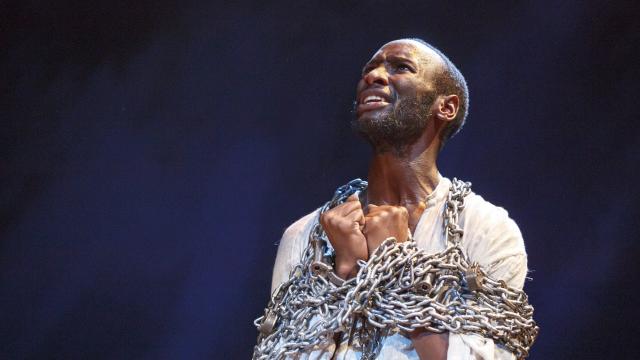
Nathan Alan Davis's new play, Nat Turner in Jerusalem, at the New York Theatre Workshop, presents Turner, shackled in a holding room, contemplating the sunset. It is the evening before his execution after his recent conviction of leading the infamous and bloody August 1831 slave rebellion. "The sun will set over the hill. Then it will be the moon’s turn to keep watch over Jerusalem. And tomorrow, all of Virginia will come to the gallows to watch me die." Turner (Phillip James Brannon) hardly seems distraught about his execution, although he wonders about others' reaction. He firmly believes that God sent him to carry out his gruesome murders, but will others agree that his rebellion was God's will? "... you’ve shown me Heaven. But how can I go there with peace tomorrow if my work on earth has come to nothing?" On this last night, he agreesto talk once more to Thomas R. Gray (Rowan Vickers), a struggling and ambitious lawyer. Each man wants the whole story told, but each wants it told his own way and for his own reasons. A week previously, Gray had recorded Turner’s confession of leading six other slaves in a slaughter of over 50 slave owners and their families. He hopes Turner's confession will insure him financial and historical credibility. Turner admitted to murdering all who has ever owned him, along with their families, including the ten-year-old boy who was Turner's last owner. Retribution was fierce, even against many slaves not involved in the revolt, but Turner managed to escape and hide nearby. Two months after the uprising, a farmer found Turner who was sent to Jerusalem, Virginia, and jailed. In this final visit, Gray is back again to explore Turner's motives and discover if Turner knows of any imminent rebellions. Turner insists that he was inspired by God as retribution to the horrors of slavery and denies upcoming attacks. " My purpose is accomplished." Gray recognizes Turner's intelligence and admires his eloquence, but what he and others find it difficult to accept, was the killing of babies. Turner, with his resonant voice and stately demeanor, reminds Gray of slavery. "“Do you not know how many children are being crushed 'neath the foot of this nation? Stolen from their mothers, driven from their homes, hunted as for sport?” Directed by Megan Sandberg-Zakian, Brannan's portrayal gives Turner a single-minded determination and charisma and emphasizes the former slave's messianic defense of rebellion against the transgression of slavery. Brannon also evokes a palpable aura of aloneness even with his numerous allusions from the Bible. Vickers does double duty as both the plodding lawyer, Gray, who first appears poised but intermittently shows fear of Turner. He also portrays a sympathetic young prison guard who cannot condone Turner's murders but kindly brought him fresh bread. Basically, however, he is a listening partner for the loquacious, Bible-quoting prisoner. Scenic design by Susan Zeeman Rogers features a wooden platform on the long stage area with the audiences on two sides. Movement is static except for intermittent motion of the platform until it has reached the opposite side of the stage. Effective lighting by Mary Louise Geiger depicts the time of day but during blackouts the incongruously loud contemporary street music is off-putting. Nat Turner has been an intriguing subject since Gray's original account of Turner followed later by William Styron's best-selling “Confessions of Nat Turner” and the upcoming film, “Birth of a Nation” by Nat Parker. Unfortunately, Nathan Alan's Davis' play about the event is factually over-dramatized with stilted dialogue, assumedly to delineate the era. The result has blunted the inherent argument of hero or villain, morality, and the ethical issues of race relations and human respect that are relevant today.
